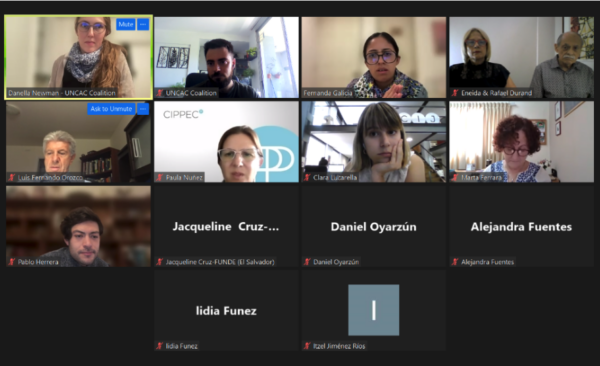4 December 2023 –
Anti-corruption advocacy by civil society organizations in Latin America has existed since the late 1980s, and many organizations, including some UNCAC Coalition Members and Affiliates, have more than 30 years of experience as anti-corruption watchdogs. Staying relevant and breaking ground on new, diverse topics has permitted these organizations to remain active, especially considering recent degradation of civic space in the region.
Ahead of the 10th Conference of the States Parties (CoSP) of the UNCAC, members and affiliates of the UNCAC Coalition from Latin America and the Caribbean came together on November 4th 2023 to discuss efforts to innovate in the field of anti-corruption advocacy and share their outlook for future potential for innovation.
Identifying potential partners for anti-corruption advocacy
After a brief presentation on innovation as a general concept, participants shared their organization’s experiences doing advocacy work with different partners and targets. Representatives from organizations from Paraguay, Puerto Rico, Chile and Argentina all highlighted new projects focusing on media organizations and journalists. As a representative from Asociación Chilena de Voluntarios, from Chile, noted, “even a massive, global event like the CoSP is relatively unheard of in media circles” and said that he, “has to (metaphorically) give a small lecture about the CoSP and its importance whenever he speaks to journalists.” Other members and affiliates also noted the need to verse journalists in the UNCAC review mechanism and to help them understand events like the CoSP.
Another potential actor that was discussed were at-risk populations, including homeless persons, community human rights activists and disabled persons. Corruption deeply and disproportionately affects these groups, so integrating them into anti-corruption advocacy could help strengthen research and advocacy relating to corruption. A representative from Mexiro, from Mexico, shared an initiative they have been working on with community human rights activists in rural Mexico which she claims has improved the way they reach out to local and state officials when it comes to their advocacy.
Finally, regarding challenges of tackling corruption in public procurement, participants spoke about the need of raising awareness of corruption risks and anti-corruption best practices when speaking to professional associations, engineers, and large, private corporations. As many times these actors can be roped into corrupt networks, it is especially important for them to know the risks that corruption may have on the greater public and the legal consequences they may have. A representative from Semillas para la Democracia, from Paraguay, noted that regardless of the bad reputation that private enterprises get as being the “supply side” of corruption, integrating compliance officers and other high-level officers into anti-corruption advocacy may deter future unethical behaviour.
Conclusions and the way forward
Ahead of CoSP10, the UNCAC Coalition, its members and affiliates, are preparing to advocate for anti-corruption and integrity at the highest level. After more than 30 years of work, civil society organizations from Latin America and the Caribbean are committed to keeping up with the times, innovating, and ensuring that their governments are held to the highest ethical standards.




